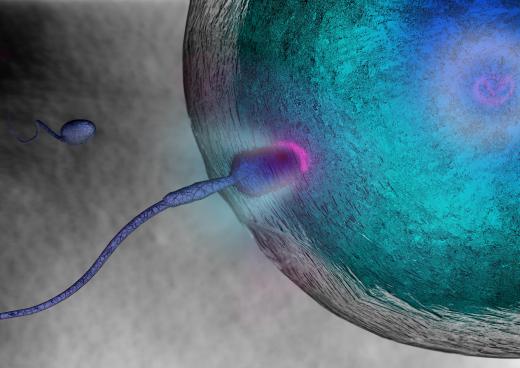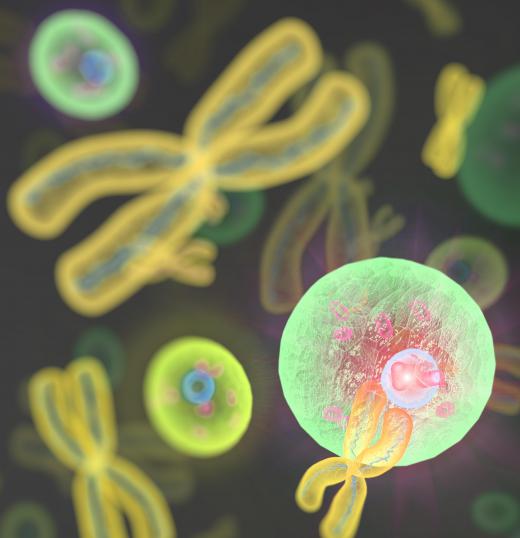What is a Chromosomal Aberration?
 Mary McMahon
Mary McMahon
A chromosomal aberration is an abnormality in the structure or number of chromosomes in an organism. Depending on the nature of the aberration, it can lead to severe birth defects, potentially including defects incompatible with life. Chromosomal aberrations can be diagnosed with the use of a karyotype, a visualization of an organism's complete set of chromosomes, where functional changes in the chromosomes will be readily visible. Treatment for people with chromosomal aberrations involves the provision of supportive care, as it is not possible to cure conditions caused by problems with the chromosomes.
The cause of a chromosomal aberration is usually a problem during cell division, either when cells divide to make gametes used in reproduction, or when cells are in the process of dividing in the embryonic state. Exposure to radioactive substances and chemicals known to cause mutations can cause abnormalities in the gametes that will be passed on to embryos in the event those gametes are used in fertilization. If errors occur during embryonic cell division, the resulting organism will exhibit genetic mosaicism, where some of the cells have a healthy set of chromosomes, and others display a chromosomal aberration.

Numerically, it is possible for a person to have three sets of chromosomes instead of two in one or more cases, creating an uneven number of total chromosomes. Conversely, a single chromosome instead of a pair may appear at one or more locations. The nature of the impairments experienced as a result of this type of chromosomal aberration vary; a well-known example of a numerical chromosomal aberration is Down Syndrome, where people have an extra 21st chromosome.

Structurally, chromosomal aberrations can include deletions, insertions, rings, inversions, translocations, and duplications. These may lead to a variety of birth defects and in some cases, a person may not have any noticeable symptoms because the aberration is minor. All of these aberrations can potentially be passed on to descendants, depending on what happens during cell division. In some cases, chromosomal aberrations render people effectively sterile.

Some chromosomal aberrations can be identified during pregnancy. An embryo may fail to develop as expected, leading to a diagnosis, or prenatal testing could provide information about genetic conditions. In some cases, these conditions lead to fetal death and a woman miscarries or experiences a stillbirth. People who experience pregnancy loss as a result of chromosomal aberrations may want to consider genetic testing to learn more about the risk of problems with future pregnancies.
AS FEATURED ON:
AS FEATURED ON:

















Discussion Comments
@geekish - The reason the genetic counselor students were in the class were because with each disorder you learn about; you learn the genetics of the disorder and therefore what the research says about someone with a disorder passing it on to their children.
I think this class was specifically a good one for them to take because there is a common chromosomal abnormality that occurs within the realm of craniofacial anomalies called cleft lip and/or palate.
By taking the class those genetic counselor students will also be able to tell the family some important fact about the disorder. For example, they would be able to tell parents that children with cleft lip and palate disorder have a low percentage of intellectual disability, and I high success rate of surgery fixing the cleft.
I would imagine that being able to tell families such information will make them knowledgeable counselors and help put a family to ease when such an instance arises.
I do not know the training details of genetic counselors but I do know that the class they were in with me was a graduate level course, so that indicates some advanced training!
@amysamp - Out of curiosity, why were genetic counselors in your speech pathology classes?
My husband and I were talking about having a baby and we have a bit of a family history of some disorders that may come from a chromosomal aberration so we were curious how well trained genetic counselors were.
@geekish - In one of my speech pathology (commonly referred to as speech therapy) graduate school courses we had genetic counselors join us and that was around 2006. The class was dedicated to a specific type of disorders, called craniofacial anomalies.
I don't know how long genetic counselors have been around but I know the certification of genetic counselors began in 1981. So I would say that is still relatively recent.
I have heard of genetic counselors before but I have never met one and they don't seem all that common. Is it a rather new profession?
Post your comments